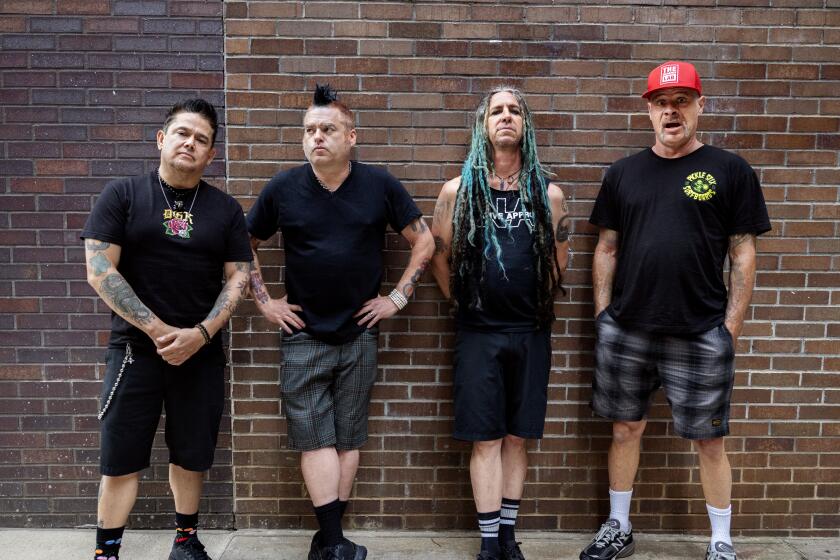Now It’s the Recording Industry’s Turn to Face the Music
Scandal and reform. Then more scandal and more reform.
Those turkeys keep coming home to roost.
This week it’s the non-singing singing group Milli Vanilli that’s caught up in another show-business scandal.
If it makes the Vanillis feel any better in this thank-goodness-it’s-Thanksgiving week, there may be hope for them. Look what’s happened over on the sports pages:
* Canadian sprinter Ben Johnson, banned for life for steroid use, is back in business.
* Dexter Manley, banned from football for drug abuse, is also back in business.
* Pete Rose, banned for life in baseball for betting, is still being touted as a Hall of Famer.
Redemption lives!
The Vanillis could have saved themselves a lot of trouble by getting banned for life, then going off to some mountaintop religious retreat to work in silence. Or they could have done some public-service work somewhere, say, for the musically impaired. A few months of that and they’d be back in business, lip-syncing their way to another Grammy.
But show business isn’t exactly sports and what happens next in this latest scandal is not so much what the Vanillis will do, but what the music community will do.
What compounds the issue is the fact that technology is helping a growing number of performers expand truth as it never has been expanded before:
* Singers are body miked, their voices amplified to reach far corners of concert halls and outdoor arenas.
* Recordings--pop and classical--are dubbed and retracked and enhanced to a degree only dreamed of by mere human performers.
* Old recordings and old movies are born again in sound and color.
* Most of the video industry seems based on lip-synchronized and computer-engineered performances.
* Computers send cars into space in television commercials and humans co-exist with animation in motion pictures.
Truth may be resting somewhere on the head of a diode.
Where truth rests in show business is what the current arguments may be about.
Some people still believe that despite advances in medical science, Band-Aids do the healing. So Band-Aids will be offered up in the weeks ahead: pledges of truth in performance will be bronzed, committees will form to oversee honesty in videos and discs, declarations of ethics will be chiseled in stone, labels declaring veracity will be pasted on videos.
It may take more than monumental patching, though. Even Band-Aids curl up and get washed away, leaving the hurt. There is a long, uneven history to how show business has tried to cure its ills. Strong measures, not stick-ons, generally have worked.
When Hollywood sex scandals and the messages of certain movies became too embarrassing for some people in the ‘20s and ‘30s, film makers tried self-censorship, strict regulations, the rule of czars, morality by an iron hand. Those forms of content control eventually gave way to the production code and the film ratings system, still an imperfect arrangement but one that provides a sense of standards and leadership.
When television quiz shows in the late ‘50s turned out to be more quizzical than honest with contestants getting answers before the questions, strong measures were taken. Shows were dropped. Producers disappeared. New controls were put into place. Lessons, hopefully, were learned.
To some extent, the same may not have happened in radio. When payola and play lists came into the common vocabulary in the ‘60s, government agencies and networks moved in. Disc jockey and programmer jobs were lost, brooms swept through studios and executive offices. How long these measures have worked may still be uncertain, especially if there is any truth to allegations made earlier this year about record promoters paying off a new generation of deejays.
Now back to the Milli Vanilli affair and what might happen next. One course may be to do what others in the record industry do: attach labels that declare the voices heard are the real article.
Or the industry could learn from some of the stronger measures in show-business history: tougher rules, tougher administrators, tougher administration of the rules.
Or it could turn to the sports pages for answers.
More to Read
The biggest entertainment stories
Get our big stories about Hollywood, film, television, music, arts, culture and more right in your inbox as soon as they publish.
You may occasionally receive promotional content from the Los Angeles Times.










